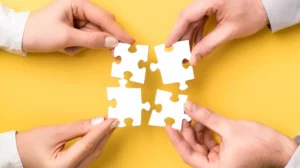In today’s rapidly changing world, cultivating a culture of continuous learning is crucial for individuals and organizations alike.
Embracing a growth mindset allows us to adapt, grow, and thrive in the face of challenges and opportunities. It is the key to unlocking our full potential and achieving success.
In this blog post, we will explore the concept of a growth mindset and provide actionable strategies to nurture it within ourselves and our teams.
Understanding the Growth Mindset
Before we delve into cultivating a culture of continuous learning, let’s first understand what a growth mindset entails.
Coined by psychologist Carol Dweck, a growth mindset is the belief that our abilities and intelligence can be developed through dedication, effort, and learning. It is the understanding that talents and skills are not fixed traits but can be honed and improved over time.
Fostering a Learning-Oriented Environment
To cultivate a culture of continuous learning, it is essential to create an environment that fosters curiosity, exploration, and experimentation. Here are some strategies to help you achieve this:
Encourage a thirst for knowledge
Emphasize the value of learning and curiosity within your organization.
Encourage employees to seek out new information, explore diverse perspectives, and ask questions. Foster a safe space where individuals feel comfortable sharing their thoughts and ideas.
Promote learning opportunities
Provide access to learning resources such as books, online courses, and workshops.
Encourage employees to attend conferences, seminars, and industry events. Support their participation in training programs and offer mentorship opportunities.
By investing in their growth, you demonstrate your commitment to their development.
Celebrate learning achievements
Recognize and celebrate the learning achievements of individuals and teams. Acknowledge their efforts in acquiring new skills and knowledge.
By doing so, you reinforce the idea that learning is valued and integral to personal and professional growth.
Embracing Failure as a Learning Opportunity
A growth mindset involves viewing failures and setbacks as stepping stones to success rather than roadblocks.
Here’s how you can foster a positive attitude towards failure:
Encourage risk-taking
Create an environment where individuals feel comfortable taking risks and trying new approaches. Encourage experimentation and innovation.
Make it clear that mistakes are not punished but seen as opportunities for growth and learning.
Provide constructive feedback
When mistakes occur, provide constructive feedback that focuses on learning and improvement rather than blame.
Help individuals understand what went wrong and how they can do better next time. Encourage them to reflect on their experiences and develop strategies for overcoming challenges.
Lead by example
As a leader, demonstrate a growth mindset by openly sharing your own failures and what you learned from them.
Emphasize the importance of resilience, perseverance, and continuous improvement. By doing so, you inspire others to embrace failure as a valuable learning experience.
Encouraging Collaboration and Knowledge Sharing
Collaboration and knowledge sharing are essential components of a culture of continuous learning. Here’s how you can foster these practices:
Foster a collaborative environment

Encourage teamwork and collaboration within your organization. Create opportunities for cross-functional projects and encourage employees to work together on shared goals. Foster a culture of mutual support and collective growth.
Establish learning communities
Encourage the formation of learning communities or interest groups within your organization. These groups can provide a platform for employees to share knowledge, exchange ideas, and learn from one another.
Consider organizing regular knowledge-sharing sessions or lunch-and-learn events.
Recognize and reward knowledge sharing
Acknowledge and reward individuals who actively contribute to the learning and development of others.
This can be done through formal recognition programs or by simply expressing appreciation for their efforts. By doing so, you create an incentive for knowledge sharing and foster a culture of continuous learning.
Continual Growth and Development
Nurturing a growth mindset is an ongoing process. It requires consistent effort and dedication. Here are some additional strategies to promote continual growth and development:
Set learning goals
Encourage individuals to set personal learning goals aligned with their aspirations and the organization’s objectives.
Regularly review these goals and provide support and resources to help individuals achieve them.
Foster a growth-oriented performance culture
Incorporate the principles of a growth mindset into your performance management processes.
Focus on individual progress, effort, and improvement rather than solely on outcomes. Provide opportunities for professional development and career advancement.
Embrace change and adaptability
Help individuals understand the importance of embracing change and developing adaptability skills.
Encourage them to seek out new challenges and opportunities for growth. Provide support during times of organizational change to help individuals navigate uncertainty and learn from new experiences.
Conclusion
A culture of continuous learning and nurturing a growth mindset, you empower individuals and organizations to reach their full potential. Embrace the principles outlined in this blog post, and watch as your teams thrive, innovate, and achieve remarkable success.
Remember, learning is a lifelong journey, and with the right mindset, the possibilities are limitless.




